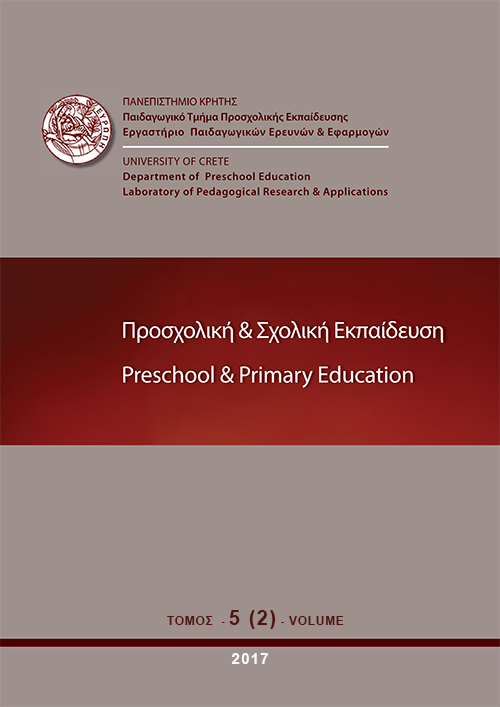Η επίδραση της πολυδιάστατης διδακτικής προσέγγισης και της αναπτυξιακής διδακτικής προσέγγισης στην επιστημολογική ανάπτυξη των μαθητών της Στ’ τάξης Δημοτικού σχολείου στο μάθημα των Φυσικών Επιστημών

Περίληψη
Η παρούσα έρευνα διερευνά την επίδραση του διαφορετικού είδους διδασκαλίας στην επιστημολογική ανάπτυξη των μαθητών Στ΄ τάξης, μέσω ενός παρεμβατικού προγράμματος στο μάθημα των Φυσικών Επιστημών, αξιοποιώντας τόσο ποσοτικά όσο και ποιοτικά δεδομένα. Εννιά τμήματα Στ΄ τάξης δημόσιου Δημοτικού Σχολείου έλαβαν μέρος στην έρευνα, συμπληρώνοντας εργαλεία που αξιολογούν την επιστημολογική ανάπτυξη και τη γνωστική ικανότητα των μαθητών. Δώδεκα από τους μαθητές έλαβαν επίσης μέρος σε ατομική ημιδομημένη συνέντευξη, με ερωτήσεις για την αποτελεσματικότητα του παρεμβατικού προγράμματος. Η επιστημολογική ανάπτυξη των μαθητών αξιολογήθηκε με τη συντομευμένη έκδοση του ερωτηματολογίου των Schommer, Mau, Brookhart και Hutter (2000) για φοιτητές και μαθητές ενώ η γνωστική ικανότητα αξιολογήθηκε με τις Προοδευτικές Μήτρες του Raven (Raven, 1998). Η παρούσα έρευνα στόχο είχε να εντοπίσει ποια από τις δύο διδακτικές παρεμβάσεις που εφαρμόζονται ήταν πιο αποτελεσματική για την επιστημολογική ανάπτυξη και κατά πόσο η γνωστική ικανότητα σχετίζεται με την επιστημολογική ανάπτυξη των μαθητών. Μέσα από την παρούσα έρευνα προέκυψε ότι η επιστημολογική ανάπτυξη μπορεί να υποβοηθηθεί μέσα από τη διδακτική παρέμβαση και ότι η διδακτική παρέμβαση μπορεί να προβλέψει τη γνωστική ικανότητα στο επίπεδο της επιστημολογικής ανάπτυξης.
Λεπτομέρειες άρθρου
- Πώς να δημιουργήσετε Αναφορές
-
Ioannou, K., & Christodoulou, N. (2017). Η επίδραση της πολυδιάστατης διδακτικής προσέγγισης και της αναπτυξιακής διδακτικής προσέγγισης στην επιστημολογική ανάπτυξη των μαθητών της Στ’ τάξης Δημοτικού σχολείου στο μάθημα των Φυσικών Επιστημών. Preschool and Primary Education, 5(2), 101–124. https://doi.org/10.12681/ppej.14282
- Τεύχος
- Τόμ. 5 Αρ. 2 (2017)
- Ενότητα
- Άρθρα

Αυτή η εργασία είναι αδειοδοτημένη υπό το CC Αναφορά Δημιουργού – Μη Εμπορική Χρήση – Παρόμοια Διανομή 4.0.
Οι συγγραφείς των άρθρων που δημοσιεύονται στο ΠΡΟΣΧΟΛΙΚΗ & ΣΧΟΛΙΚΗ ΕΚΠΑΙΔΕΥΣΗ διατηρούν τα δικαιώματα πνευματικής ιδιοκτησίας επί των άρθρων τους, δίνοντας στο περιοδικό το δικαίωμα της πρώτης δημοσίευσης. Άρθρα που δημοσιεύονται στο ΠΡΟΣΧΟΛΙΚΗ & ΣΧΟΛΙΚΗ ΕΚΠΑΙΔΕΥΣΗ διατίθενται με άδεια Creative Commons 3.0 και σύμφωνα με την άδεια μπορούν να χρησιμοποιούνται ελεύθερα, με αναφορά στο/στη συγγραφέα και στην πρώτη δημοσίευση για μη κερδοσκοπικούς σκοπούς και με δικαίωμα τροποποίησης μόνον με παρόμοια διανομή (αν αναμείξετε, τροποποιήσετε, ή δημιουργήσετε πάνω στο υλικό, πρέπει να διανείμετε τις δικές σας συνεισφορές υπό την ίδια άδεια όπως και το πρωτότυπο). To Εργαστήριο Παιδαγωγικών Ερευνών και Εφαρμογών του Παιδαγωγικού Τμήματος Προσχολικής Εκπαίδευσης του Πανεπιστημίου Κρήτης και το Εθνικό Κέντρο Τεκμηρίωσης διατηρούν το δικαίωμα να δημοσιεύουν, να αναπαραγάγουν, να παρουσιάζουν στο κοινό, να διανέμουν και χρησιμοποιούν άρθρα που δημοσιεύονται στο ΠΡΟΣΧΟΛΙΚΗ & ΣΧΟΛΙΚΗ ΕΚΠΑΙΔΕΥΣΗ σε οποιοδήποτε μέσο και μορφή είτε μεμονωμένα είτε ως μέρη συλλογικών έργων, για όλο το χρόνο διάρκειας προστασίας της πνευματικής ιδιοκτησίας και για όλες τις χώρες του κόσμου. Αυτό περιλαμβάνει ενδεικτικά και όχι αποκλειστικά, το δικαίωμα δημοσίευσης των άρθρων σε τεύχη του περιοδικού ΠΡΟΣΧΟΛΙΚΗ & ΣΧΟΛΙΚΗ ΕΚΠΑΙΔΕΥΣΗ, αναπαραγωγής και διανομής μεμονωμένων αντιγράφων των άρθρων, αναπαραγωγής ολόκληρων των άρθρων σε άλλη έκδοση του Εργαστηρίου Παιδαγωγικών Ερευνών και Εφαρμογών του Παιδαγωγικού Τμήματος Προσχολικής Εκπαίδευσης του Πανεπιστημίου Κρήτης και του Εθνικού Κέντρου Τεκμηρίωσης και αναπαραγωγής και διανομής των άρθρων ή περίληψης αυτών με χρήση πληροφορικού συστήματος αποθετηρίου.


